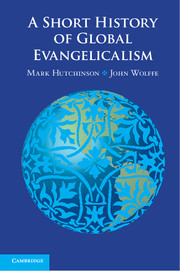Book contents
- Frontmatter
- Contents
- Figures
- Tables
- Preface
- Abbreviations
- 1 Understanding Evangelicalism
- 2 The ‘Surprising Work of God’: Origins to 1790s
- 3 Volunteering for the Kingdom: 1790s to 1840s
- 4 The Kingdom Enlarged and Contested: 1840s to 1870s
- 5 A New Global Spiritual Unity: 1870s to 1914
- 6 Fighting Wars and Engaging Modernity: 1900s to 1945
- 7 Towards Global Trans-Denominationalism: 1945 to 1970s
- 8 ‘The Actual Arithmetic’: A Survey of Contemporary Global Evangelicalism
- 9 Localism and Transnationality: 1970s to 2010
- 10 Conclusion
- Further Reading
- Index
- References
1 - Understanding Evangelicalism
Published online by Cambridge University Press: 05 June 2012
- Frontmatter
- Contents
- Figures
- Tables
- Preface
- Abbreviations
- 1 Understanding Evangelicalism
- 2 The ‘Surprising Work of God’: Origins to 1790s
- 3 Volunteering for the Kingdom: 1790s to 1840s
- 4 The Kingdom Enlarged and Contested: 1840s to 1870s
- 5 A New Global Spiritual Unity: 1870s to 1914
- 6 Fighting Wars and Engaging Modernity: 1900s to 1945
- 7 Towards Global Trans-Denominationalism: 1945 to 1970s
- 8 ‘The Actual Arithmetic’: A Survey of Contemporary Global Evangelicalism
- 9 Localism and Transnationality: 1970s to 2010
- 10 Conclusion
- Further Reading
- Index
- References
Summary
In October 1757, Thomas Haweis, a young Cornishman, was ordained to the curacy of St Mary Magdalen church in Oxford. His ministry rapidly stirred strong reactions. According to Charles Wesley, a co-founder of Methodism, Haweis preached ‘Christ crucified, with amazing success’ and drew large crowds both from the university and the city. On the other hand, students jeered Haweis in the street, shouting ‘There goes the saver of souls!’ Stones were thrown through the church windows while he was preaching, and ‘This is the back way to Hell’ was chalked on the church doors. More orderly, but ultimately more effective, critics eventually forced Haweis to leave Oxford in 1762. Not to be repressed, Haweis subsequently published a selection of the sermons he had delivered in Oxford under the overall title of Evangelical Principles and Practice. It was one of the earliest attempts systematically to set out the theological outlook of the developing evangelical movement and its implications for Christian devotion and practice. Haweis's starting point was ‘The Divinity of the SON and SPIRIT, co-eternal and co-equal with the FATHER’. He affirmed ‘the inability of man in his fallen state to do any thing but evil’ and the impossibility of human compliance with God's Law. Hence, ‘the one great glorious and all-sufficient oblation of the SON of GOD for the sins of the world, as a true and real sacrifice, atonement and propitiation is pleaded for; its necessity and influence proved; and the various blessings obtained for sinners thereby, set forth.’
Justification and acceptance with God came, Haweis believed, through faith alone, but ‘works of piety and virtue’ were a necessary outcome of faith. True holiness lay in becoming a new creation through faith in Jesus Christ, leading a life empowered by the indwelling of the Holy Spirit. The believer should seek to grow in holiness through study and meditation on the Scriptures, through self-examination and prayer and through converse with other believers and devout attendance at Holy Communion.
- Type
- Chapter
- Information
- A Short History of Global Evangelicalism , pp. 1 - 24Publisher: Cambridge University PressPrint publication year: 2012



